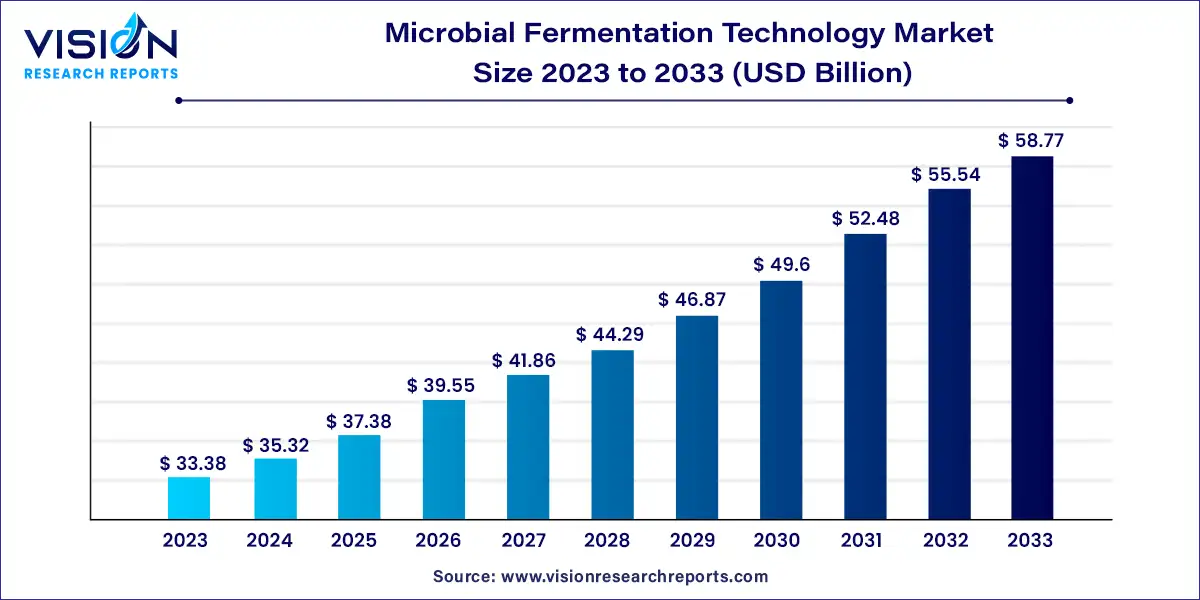The global microbial fermentation technology market size was reached at USD 33.38 billion in 2023 and it is expected to hit around USD 58.77 billion by 2033, poised to grow at a CAGR of 5.82% from 2024 to 2033.

Understanding Microbial Fermentation
Microbial fermentation involves the metabolic process where microorganisms such as bacteria, fungi, or yeast convert organic compounds into useful products under controlled conditions. This technology encompasses a wide range of applications, including the production of enzymes, antibiotics, vitamins, and biofuels.
Key Pointers
- Asia Pacific led the market with the largest market share of 46% in 2023.
- By Application, the antibiotics segment captured the largest market share of 33% in 2023.
- By End-user, the The CMOs and CDMOs segment captured the maximum market share of 43% in 2023.
Get a Sample@ https://www.visionresearchreports.com/report/sample/39494
Factors Driving Market Growth
- Increasing Demand for Bio-based Products: The growing consumer preference for eco-friendly and sustainable products is driving the demand for bio-based alternatives. Microbial fermentation technology offers a sustainable approach to product manufacturing by utilizing renewable resources and reducing reliance on fossil fuels.
- Advancements in Biotechnology and Genetic Engineering: Continuous advancements in biotechnology and genetic engineering have enhanced the efficiency and scalability of microbial fermentation processes. Novel strains of microorganisms, coupled with improved fermentation techniques, are enabling the production of a wide range of valuable products.
- Environmental Sustainability Driving Adoption: Environmental sustainability has become a key driver for the adoption of microbial fermentation technology. Industries are increasingly seeking ways to reduce their environmental footprint and minimize waste generation. Microbial fermentation offers a sustainable solution by utilizing organic waste streams and producing biodegradable products.
Microbial Fermentation Technology Market Top Trends:
- Rise of Personalized Medicine: With advancements in microbial fermentation technology, personalized medicine is becoming increasingly feasible. Tailor-made therapeutics, vaccines, and diagnostic tools are being developed to cater to individual patient needs, revolutionizing healthcare delivery.
- Expansion of Food and Beverage Industry: The food and beverage industry is experiencing a surge in demand for fermented products. Microbial fermentation technology is being utilized to produce a variety of items such as yogurt, cheese, beer, and wine, offering unique flavors, extended shelf life, and enhanced nutritional profiles.
- Emerging Applications in Pharmaceuticals: Microbial fermentation technology is gaining traction in the pharmaceutical sector. From the production of antibiotics to biopharmaceuticals, this technology offers cost-effective and sustainable solutions for drug synthesis and manufacturing, driving innovation in the pharmaceutical industry.
Challenges and Limitations
- Regulatory Hurdles and Safety Concerns: One significant challenge is navigating regulatory requirements and addressing safety concerns associated with microbial fermentation processes. Compliance with stringent regulations and ensuring product safety are paramount, particularly in industries such as healthcare and food production.
- Technological Limitations and Scalability Issues: Despite advancements, microbial fermentation technology still faces technological limitations, particularly regarding scalability and process optimization. Scaling up production while maintaining product quality and consistency remains a challenge for many companies operating in this space.
- Competition from Alternative Technologies: Microbial fermentation technology faces competition from alternative production methods, such as chemical synthesis and plant-based production. While microbial fermentation offers advantages in terms of sustainability and efficiency, competing technologies may pose challenges in terms of cost-effectiveness and scalability.
Applications of Microbial Fermentation Technology
Pharmaceutical Industry
In the pharmaceutical sector, microbial fermentation serves as a cornerstone of drug manufacturing. Antibiotics, vaccines, and therapeutic proteins are among the many products synthesized through this technology. For instance, the production of insulin for diabetic patients relies heavily on microbial fermentation processes, ensuring a stable and sustainable supply of this life-saving medication.
Food and Beverage Production
Microbial fermentation has long been employed in the production of various food and beverage products, imparting unique flavors, textures, and nutritional profiles. From the tangy kick of yogurt to the bubbly effervescence of beer, microbial fermentation adds depth and complexity to culinary delights while extending shelf life and enhancing food safety.
Renewable Energy
In the quest for sustainable energy sources, microbial fermentation emerges as a promising avenue for biofuel production. Microorganisms can ferment biomass, such as agricultural residues and algae, into bioethanol and biodiesel, offering a renewable alternative to fossil fuels. This eco-friendly approach mitigates greenhouse gas emissions and reduces dependence on finite resources, ushering in a greener, more sustainable energy landscape.
Environmental Remediation
Beyond industrial applications, microbial fermentation technology plays a crucial role in environmental remediation efforts. Certain microorganisms possess the ability to degrade pollutants and toxins, facilitating the cleanup of contaminated soil, water, and air. Through bioremediation processes, microbial communities transform hazardous substances into harmless byproducts, contributing to environmental stewardship and ecosystem restoration.
Read More: https://www.heathcareinsights.com/pharmaceutical-regulatory-affairs-market/
Fermentation Technology Market Key Companies
- Biocon Ltd.
- BioVectra Inc.
- Danone UK
- F. Hoffmann-La Roche AG
- Koninklijke DSM NV
- Lonza
- Novozymes A/S
- TerraVia Holdings, Inc.
- BIOZEEN
Fermentation Technology Market Report Segmentation
By Application
- Antibiotics
- Probiotics Supplements
- Monoclonal Antibodies
- Recombinant Proteins
- Biosimilars
- Vaccines
- Enzymes
- Small Molecules
- Others
By End-user
- Bio-Pharmaceutical Companies
- Contract Research Organizations (CROs)
- CMOs & CDMOs
- Academic & Research Institutes
By Region
- North America
- Europe
- Asia Pacific
- Latin America
- Middle East & Africa
Buy this Premium Research Report@ https://www.visionresearchreports.com/report/checkout/39494
You can place an order or ask any questions, please feel free to contact sales@visionresearchreports.com| +1 650-460-3308
